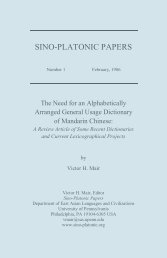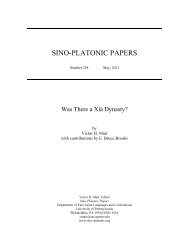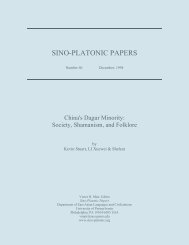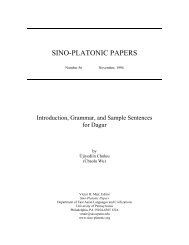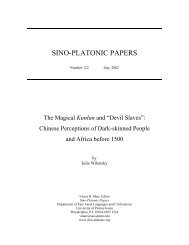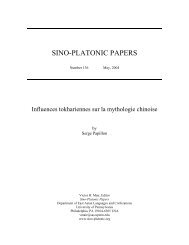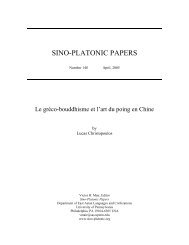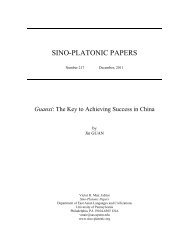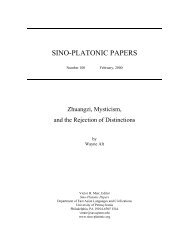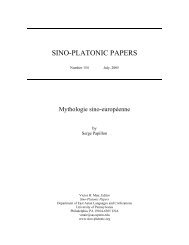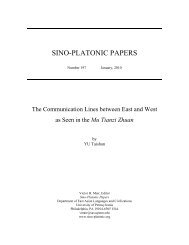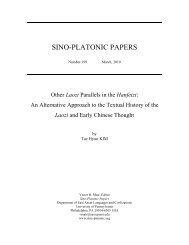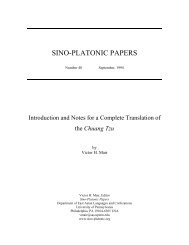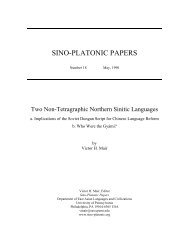Slips of the Tongue and Pen in Chinese - Sino-Platonic Papers
Slips of the Tongue and Pen in Chinese - Sino-Platonic Papers
Slips of the Tongue and Pen in Chinese - Sino-Platonic Papers
You also want an ePaper? Increase the reach of your titles
YUMPU automatically turns print PDFs into web optimized ePapers that Google loves.
David Moser, "<strong>Slips</strong> <strong>of</strong> <strong>the</strong> <strong>Tongue</strong> <strong>and</strong> <strong>Pen</strong> <strong>in</strong> Ch<strong>in</strong>ese"<br />
S<strong>in</strong>o-<strong>Platonic</strong> <strong>Papers</strong>, no. 22 (March 199 1 )<br />
Ex. 39. " {$ iSt, @ fE - 8 8 ."<br />
"NY sh7iode gen *tianhua yiy'ang hgo.' ("What you said was beautifully<br />
* eloquent .")<br />
a. @ & 8 - @ g5n ti~nnc sznhua yifang ("like heavenly<br />
maidens scatter<strong>in</strong>g flowers")<br />
b. fE - # ff gen hua yiy<strong>in</strong>g h5o ("as good as a flower")<br />
The fact that this blend <strong>of</strong> two stock phrases happened to produce<br />
(z x,<br />
a<br />
genu<strong>in</strong>e (but here ludicrously <strong>in</strong>appropriate) word "ti n h u a"<br />
"smallpox"), is no doubt partly what enabled <strong>the</strong> mistake to slip past <strong>the</strong><br />
syntactic <strong>and</strong> semantic edit<strong>in</strong>g mechanisms <strong>in</strong> speech. Note also <strong>the</strong><br />
complex way <strong>in</strong> which elements from <strong>the</strong> two phrases were comb<strong>in</strong>ed to<br />
result <strong>in</strong> <strong>the</strong> hybrid<br />
straightforward splice:<br />
utterance. The follow<strong>in</strong>g example is a more<br />
Ex. 40. u~ x<br />
a ~ 6<br />
2 a g fi f<strong>in</strong> a 5 g ~...~~<br />
dgi xiZn h g Sjr z'ai ~Ziguo' *yo'ur'enzirG de b'm xiG shi ..." ("I first have<br />
to skilfully manage some affairs <strong>in</strong> America...")<br />
a. @ 8 y6ur'bnyiiuyG ("h<strong>and</strong>le a butcher's cleaver with ease -<br />
do a job with skill <strong>and</strong> ease")<br />
b. $ f<strong>in</strong> zirc ("smoothly <strong>and</strong> easily")<br />
Though <strong>the</strong> second compet<strong>in</strong>g element here, "z>rc' ($ f<strong>in</strong>), could not have<br />
grammatically functioned by itself <strong>in</strong> <strong>the</strong> utterance, it never<strong>the</strong>less was<br />
active <strong>in</strong> <strong>the</strong> process <strong>of</strong> lexical retrieval as a compositional element <strong>in</strong> a<br />
class <strong>of</strong> phrases such as "b % w'ozir 6' ( $ $a, "easily master"),<br />
Ny\uny'ongzh? (5 )# $ $a, "use skillfully"), etc., so that <strong>the</strong> result<strong>in</strong>g<br />
blend is a very plausible utterance. Also, <strong>in</strong> keep<strong>in</strong>g with Wells' Third Law,<br />
which states that if <strong>the</strong> two orig<strong>in</strong>al words conta<strong>in</strong> <strong>the</strong> same sound <strong>in</strong> <strong>the</strong><br />
same position, a blend <strong>of</strong> <strong>the</strong>m will conta<strong>in</strong> that sound <strong>in</strong> that position, note<br />
that <strong>the</strong> compet<strong>in</strong>g phrases end with phonetically similar morphemes, both<br />
carry<strong>in</strong>g a second tone. Presumably, similar sounds can have <strong>the</strong> same<br />
k<strong>in</strong>d <strong>of</strong> contributory effect to a speech error that identical sounds can, <strong>and</strong><br />
obviously tone must be considered here as part <strong>of</strong> any metric <strong>of</strong> similarity.<br />
Ex. 41. "E g..."<br />
n~Bi wYo liii k'an..: ("AS 1 see it...")<br />
a. z'ki w6 k'm 16i ("As I see it...")<br />
b. j(;f<br />
i$&<br />
D U ~ W 1% ~ shu5 ("For me ...)



